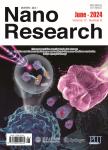Polymersomes scalably fabricated via flash nano- precipitation are non-toxic in non-human primates and associate with leukocytes in the spleen and kidney following intravenous administration
Polymersomes scalably fabricated via flash nano- precipitation are non-toxic in non-human primates and associate with leukocytes in the spleen and kidney following intravenous administration作者机构:Interdisciplinary Biological Sciences Northwestern University IL 60208 USA Department of Biomedical Engineering Northwestern University IL 60208 USA Saha Cardiovascular Research Center University of Kentucky KY40506 USA Department of Pharmacology and Nutritional Sciences University of Kentucky KY40506 USA
出 版 物:《Nano Research》 (纳米研究(英文版))
年 卷 期:2018年第11卷第10期
页 面:5689-5703页
核心收录:
学科分类:090603[农学-临床兽医学] 08[工学] 09[农学] 0906[农学-兽医学] 0837[工学-安全科学与工程]
基 金:support from the Structural Biology Facility at Northwestern University the Robert H Lurie Comprehensive Cancer Center of Northwestern University and NCI CCSG P30 CA060553 The Gatan K2 direct electron detector was purchased with funds provided by the Chicago Biomedical Consortium with support from the Searle Funds at The Chicago Community Trust DND-CAT is supported by Northwestern University, E.I. DuPont de Nemours & Co., and The Dow Chemical Company a U.S. Department of Energy (DOE) Office of Science User Facility operated for the DOE Office of Science by Argonne National Laboratory under Contract the EPIC facility of Northwestern University’s NUANCE Center, which has received support from the Soft and Hybrid Nanotechnology Experimental (SHyNE) Resource the MRSEC program the Materials Research Center the International Institute for Nanotechnology (IIN) the Keck Foundation and the State of Illinois, through the IIN support from the NSF Soft and Hybrid Nanotechnology Experimental (SHyNE) Resource the State of Illinois and International Institute for Nanotechnology (IIN) supported by the Northwestern University– Flow Cytometry Core Facility supported by Cancer Center Support Grant supported by NCI CCSG P30 CA060553 awarded to the Robert H Lurie Comprehensive Cancer Center
主 题:polymersome non-human primate nanoprecipitation toxicity biodistribution
摘 要:Vesicular nanocarrier formulations confer the ability to deliver hydrophobic and hydrophilic cargos simultaneously to cells of interest in vivo. While liposomal formulations reached the clinic long ago, younger technologies such as polymeric vesicles (polymersomes) have yet to make the transition to clinical approval and use, in part due to difficulties in ensuring their safe and scalable production. In this work, we demonstrate the scalable production of poly(ethylene glycol)-block-poly(propylene sulfide) (PEG-bl-PPS) polymersomes via flash nanoprecipitation, and further show the safe administration of these nanocarriers to mice and non-human primates. In mice, PEG-bl-PPS polymersomes were found to be well tolerated at up to 200 mg/(***). Following the administration of a more relevant 20 mg/(***) dosage in non-human primates, polymersomes were found to associate with numerous phagocytic immune cell populations, including a remarkable 68% of plasmacytoid dendritic cells and 〉 95% of macrophages in the spleen, while showing no toxicity or abnormalities in the liver, kidney, spleen, or blood. Despite the presence of a dense PEG corona, neither anti-PEG antibodies nor complement activation were detected. This work provides evidence of the translatability of PEG-bI-PPS polymersomes into the clinic for therapeutic applications in humans.



